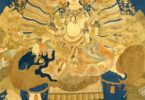《百喻经》
[The] Sūtra [Of A] Hundred Parables
(七九)为王负机喻
[79] Parable [Of] For [The] King Bearing Low Stools
昔有一王,欲入无忧园中欢娱受乐,敕一臣言:「汝捉一机,持至彼园我用坐息。」
[In the] past, [there] was a King, desiring [to] enter Sorrowless Garden within [for] amusement [to] receive joy, [who] ordered a minister, saying, ‘You [should for me] clutch a low stool, hold [it until] reaching that garden, [for] me [to] use, [for] sitting [and] resting.’
时彼使人羞不肯捉,而白王言:「我不能捉,我愿担之。」
Then, that servant [was] shy [and] not willing [to] clutch [it] , then to [the] King saying, ‘I [am] not able [to] clutch [it, but] I [am] willing [to] shoulder it.’
时王便以三十六机置其背上,驱使担之至于园中。
Then, [the] King then with thirty-six low stools placed [on] his back above, ordering [him to] shoulder them [until] reaching of [the] garden within.
如是愚人为世所笑,凡夫之人亦复如是,若见女人一发在地,自言持戒不肯捉之;后为烦恼所惑,三十六物发毛爪齿屎尿不净不以为丑,三十六物一时都捉不生惭愧,至死不舍,如彼愚人担负于机。
Thus, [the] foolish person [was] by [the] world that laughed at. Of ordinary beings’ people, [they are] likewise thus, if seeing [a] woman’s one hair on [the] ground, personally saying [they] uphold precepts [and are] not willing [to] clutch it, later by afflictions those confused, [with the] thirty-six objects, [of] hair, nails, teeth, excrement [and] urine impure, not with [them] as ugly, [with the] thirty-six objects at once all clutched, not giving rise [to] shame, until death not willing [to let them go, they are] like that foolish person [with] shouldering of [the] low stools.
[Note 1: The thirty-six (impure) objects (三十六物) (of the body) are (i) external forms’ twelve objects (外相十二物), of (1) head hair (发), (2) body hair (毛), (3) nails (爪), (4) teeth (齿), (5) eye gum (眵), (6) tears (泪), (7) saliva (涎), (8) spittle (唾), (9) excrement (屎), (10) urine (尿), (11) dirt (垢), (12) sweat (汗), (ii) body organs’ twelve objects (身器十二物), of (13) outer skin (皮), (14) inner skin (肤), (15) blood (血), (16) flesh (肉), (17) tendons (筋), (18) blood vessels (脉), (19) bones (骨), (20) marrow (髓), (21) fat (肪), (22) grease (膏), (23) brain (脑), (24) membrane (膜), (iii) twelve objects within held (内含十二物), of (25) liver (肝), (26) gallbladder (胆), (27) intestines (肠), (28) stomach (胃), (29) spleen (脾), (30) kidneys (肾), (31) heart (心), (32) lungs (肺), (33) organs with undigested food (生脏), (34) organs with digested food (熟脏), (35) red phlegm (赤痰) and (36) white phlegm (白痰).]
[Note 2: To pretend to be strictly without attachment to any part of the body while actually having much attachment to the body on the whole is being spiritually dishonest to oneself and others.
Not only is this not beneficial to anyone, it can also mislead everyone, including oneself, into thinking one is spiritually advanced, thus not truly progressing in time.
When it turns out that there is still much attachment to the impure body on the deathbed, there will be rebirth in a realm with impure bodies again, as subjects of attachment and lust.]
Namo Amituofo : Translation and notes by Shen Shi’an
上个喻
Previous Parable:
与儿期早行喻
[78] The Parable Of With The Son Expecting Morning Travel
https://purelanders.com/2023/10/07/78-the-parable-of-with-the-son-expecting-morning-travel-from-the-sutra-of-a-hundred-parables
下个喻
Next Parable:
倒灌喻
[80] The Parable Of Inverted Pouring
https://purelanders.com/2023/10/11/80-the-parable-of-inverted-pouring-from-the-sutra-of-a-hundred-parables
全百喻
All Hundred Parables:
https://purelanders.com/baiyu





